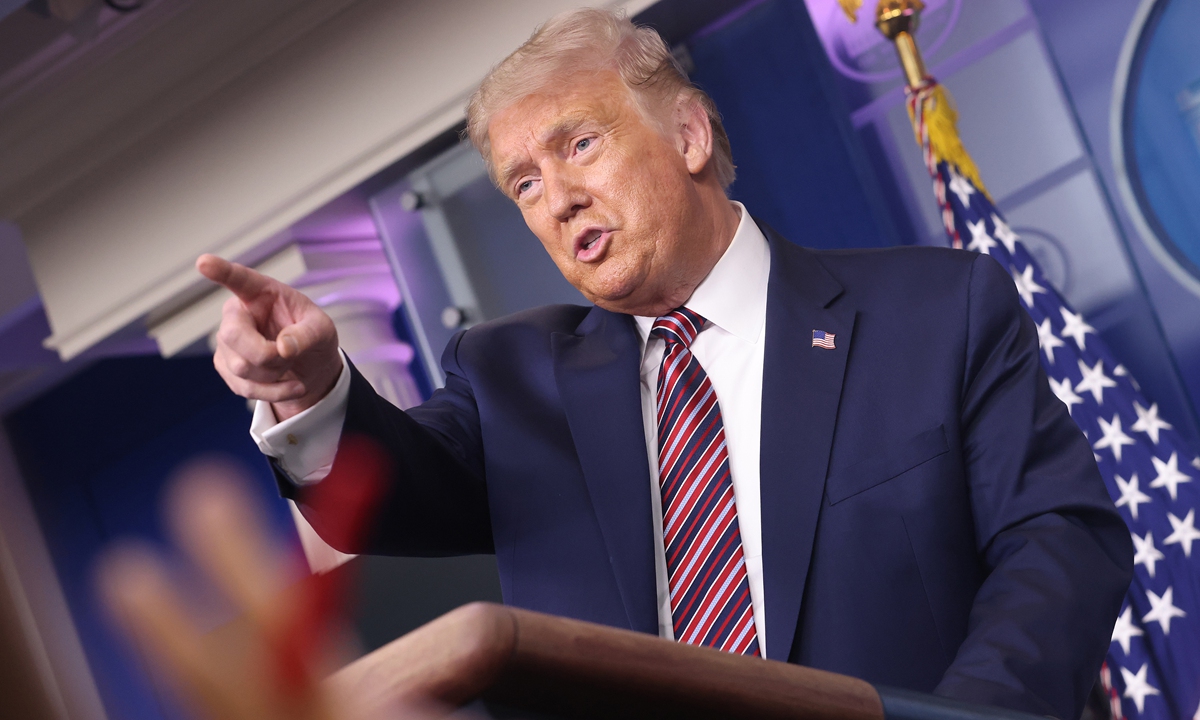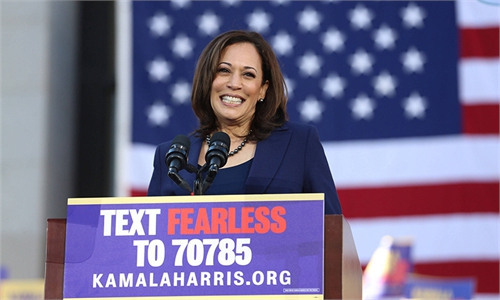
U.S. President Donald Trump speaks during a briefing at the White House on Wednesday in Washington, DC. Photo: AFP
Washington is trying to build an anti-Beijing coalition; that's nothing new. As it turns out, the US ability to unite its allies has been met with increasing setbacks. When CNN picked up the topic again on Tuesday, commentator David A. Andelman adjusted the formulation, arguing President Donald Trump is cobbling together "a coalition-of-the-willing" against China.
Andelman named Australia, India, Japan, Britain, France and Canada, listing their recent frictions with China, including the China-India border brawl, the UK's ban on Huawei, Beijing-Tokyo territorial disputes, Australia's cooling ties with China, and the arrest of Huawei CFO Meng Wanzhou by Canada. The cases are used as an excuse to claim those countries are "prepared" and "ready" to participate in an anti-China alliance.
The real question is how willing are they to join the coalition. The author just randomly listed countries with differences with China, which does not mean anything. Disputes between the same countries and the US can also be easily enumerated.
Anyone with a sober mind can tell a major reason of London's decision to ban Huawei is to appease Washington to secure easier access to the US market after Brexit. If it were not for the high pressure from the US, London would be more interested in seeking maximum benefits by cooperating with both Beijing and Washington, which explains the UK's previous changes in Huawei policy, and its earlier undecided posture over the issue.
The US and Canada seem to be good neighbors, but their relations are filled with ups and downs. Setting aside their territorial disputes, Washington is quite bossy to Ottawa. Take the North American Free Trade Agreement. Trump threatened to leave Canada out of the deal more than once to coerce the latter to concede to terms preferred by the US.
Washington has imposed waves of economic sanctions on Tokyo. The past few years saw Japan change its tough attitude toward China while adopting a flexible and pragmatic tactic in dealing with China and the US.
France has long been dissatisfied with Europe relying heavily on the US on security, and is proactively promoting EU's strategic autonomy. India's anti-China policy is more like a cheap copy of US bipartisan political fights, to win more votes. Australia seems to be reckless by following the US too closely in its anti-China rhetoric. Yet, some Australian politicians call for diplomatic independence from time to time.
Even if Washington establishes such a coalition, it is hardly a coalition of the willing, but a coalition of the coerced with different calculations. Even Andelman himself acknowledged, "Trump has done little to embrace these countries in a fashion that would encourage a joint front."
Such a coalition resembles ties between the Soviet Union and Central and Eastern Europe during the Cold War, when there were no diversified diplomacies, but only unified ideology-based policies.
Could US allies possibly be unaware of the fact that Washington's primary goal is to promote anti-China policies to secure Trump's position in the Oval Office? How much benefit would that bring to US allies? They will not take real action in following Washington, apart from verbally endorsing the US' decision. In the end, economic and social development, tackling the crisis and an independent diplomacy are those countries' own realistic pursuits.
When US Secretary of State Mike Pompeo visited Denmark in July, he wanted to shake hands upon arrival, yet was only offered shoulder pats and elbow bumps instead, which showed that Europe is unwilling to sacrifice its interests when seemingly showing a welcome attitude toward the US.
The "willingness" to stand by the US' side is probably the most difficult thing the US could obtain from its allies today.


